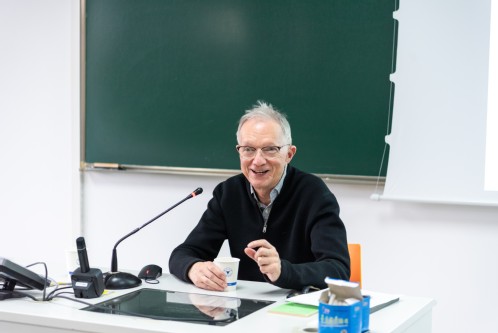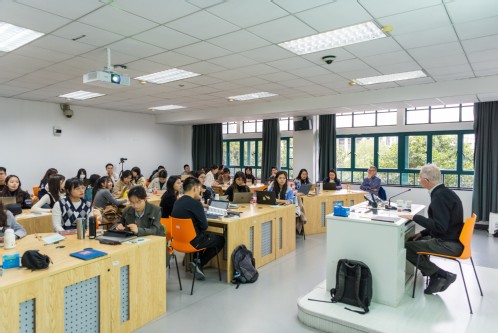On the afternoon of November 8, Allan H. Barr, a renowned sinologist, translator, and professor of Chinese in the Department of Asian Languages and Literatures at Pomona College, USA, delivered a lecture entitled “Wild Grass or Weeds?--A Discussion on the English Translation of Matt Turner’s Yecao”. Moderated by Professor GUO Guoliang, the lecture attracted a large audience of students and teachers.
Professor Allan started with an introduction to the growing interest on translations of Chinese literature in the United States, mainly reflected in the publications of more complete translations, such as San Yan and Er Pai, a vernacular novel by FENG Menglong and thousands of poems by DU Fu, as well as retranslation of different types. He believed that retranslation faces great difficulties and challenges as retranslators are not only expected to have a thorough understanding of previous translations but may face the challenge of being confined by previous translations and worse than previous ones. To illustrate, he quoted David Bellos, a famous translator, “I don’t envy re-translators of modern classics one bit. They have to steer a clifftop path between inadvertent plagiarism and gratuitous change”.

Then, he briefly illustrated the translators of LU Xun’s essays. For example, YANG Xianyi and Gladys YANG, who translated and compiled a total of 256 essays of LU Xun. Another example is a team of 14 translators on the translation of 62 essays, which were compiled into a book by chief editors, American scholars Eileen J. Cheng and Kirk A. Denton. They thought that the YANG’s expression was not natural and clear enough, so they expected to render new translations with clear and easy-to-read language to experts and ordinary readership. Regarding the differences between the two translations, Professor Allan explained with vivid examples and concluded that the concise style of the YANG’s translations mainly catered to ordinary readers; while the new translations by Eileen J. Cheng and Kirk A. Denton were more faithful to the source text and a complete translation, but they were weaker in terms of conciseness and readability. He also introduced Eileen J. Cheng’s academic stance in translation. She believed that LU Xun’s essays were classic literary works and should not be revised easily. For example, in the essay “My Views of Chastity”, there is a sentence “将时代和事实,对照起来,怎能不教人寒心而且害怕。” The translation of YANG and Gladys YANG reads, “That such a debate should continue today is enough to make anyone’s blood run cold,” while that of Eileen J. Cheng and Kirk A. Denton reads, “How can this disparity between our times and the level of debate not make us gravely disappointed and even afraid.” Professor Allan asserted that the YANG’s used the English idiom “make anyone’s blood run cold” to express the meaning, while Eileen J. Cheng and Kirk A. Denton were more faithful to the source text, literally translating it into “disappointed and even afraid”.

After that, Professor Allan underscored the English translations of LU Xun’s Yecao. Currently, there are three versions: one by YANGXianyi and Gladys YANG, another by Eileen J. Cheng, and the other by Matt Turner. Among them, Turner’s translation, published in 2019, is a new translation that emphasizes the openness, uniqueness, intense language and thoughts of the source text. Scholars who support the translation of Yecao into “Weeds” argue that it is more faithful and more specific. Professor Nick Admussen of Asian Studies at Cornell University mentioned in the preface of Turner’s version that “Weeds” has a richer connotation, and the darkness and despair of the works would be lessened if simply translated into “Wild Grass”. On the other hand, the scholars who supportthe translation of “Wild Grass” are of three views. First, “Wild Grass” corresponds completely in semantics and word count to “野草”; second, “Wild Grass” is more poetic;third, “Wild Grass” is more romantic and embodies a revolutionary spirit; fourth, “Weeds” means “杂草”. LU Xun once used “Weeds” to express the meaning of wild grass in his work “Snow”, but “Wild Grass” and “Weeds” are not equivalent.
After introducing the ideas of other scholars, Professor Allan said that the translation of “Yecao” should be rooted and explored in Chinese literature. To this end, he shared his findings with the attendees. First, in ancient Chinese classics, “Yecao” refers to a type of plant with various functions such as food for animals. Second, in classical Chinese poetry, “Yecao” is endowed with positive meanings and often used together with “flowers” in poems. For example, in The Peach Blossom Fan, a classical Chinese poetry about the love story between HOU Fangyu and LI Xiangjun in the late Ming Dynasty, there is a description that says, “Scattering flowers add beauty, weeds spreading fragrance”. Third, in modern Chinese literature, “Yecao” is usually used in a positive context. For instance, in YU Dafu’s “Clear Rain in Xixi”, there is a passage that describes the weather as “The sky is cold and overcast. When wet wind is blowing, it is a bit cold and a bit fragrant. Fragrant is the smell of wild grass and flowers”. In YU Dafu’s portrayal, wild grass is associated with a delicate fragrance. Based on the analysis of the connotations of “Yecao” in Chinese literature, Professor Allan believed that translating “Yecao” into “Wild Grass” is more reasonable. In contrast, the word “Weeds” often refers to the plants that hinder the growth of other vegetation and carries a negative connotation. Additionally, he shared a lot of photos of “wild grass”, such as goosegrass, sorrel, marlberry, and saxifrage, expanding the students’ knowledge of wild grass. Professor Allan also presented selected excerpts from the translations of “Yecao”by the YANG’s and Matt Turner, inviting the students to analyze and appreciate the expression and language styles of the two translations as well as the unique charm of each version.
At the end of the lecture, he engaged in discussions with the audience on various topics, such as the differences between the translations of A Dream of Red Mansions by YANG Xianyi and Gladys YANG and The Story of the Stone by David Hawkes, as well as the factors that impact retranslations. It has been four years since Professor Allan had delivered a lecture on “The Translation and Dissemination of YU Hua’s Works in the United States” at Zhejiang University in 2019. This time, he re-visited Zhejiang University, sharing with the students and teachers his comprehensive understanding of the translation of two Chinese characters, and meanwhile, guiding the observations of the nuances of translations, including the image, context, cognition, and expression associated with the translation of proper nouns.
Text: WU Xinying, DU Lei
Review: DU Lei, GAO Rui, Allan.H.Barr
Photos: YAN Junhao
The Chinese Academy of Translation and Translation Studies of Zhejiang University
Institute of Translation Studies, Zhejiang University
Elementary Teaching Organization of Translation Major, School of International Studies, Zhejiang University
Translated by CHEN Xirong and WU Jing, Proofread by XU Xueying



